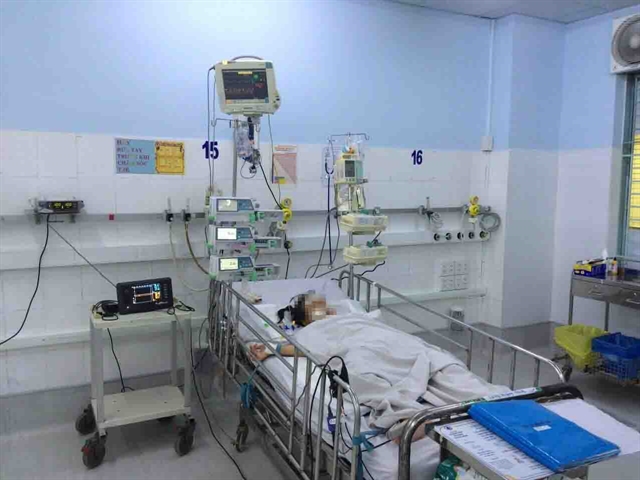 Society
Society


|
| An eight-year-old girl with inflammation of the heart muscle is treated at HCM City’s Paediatrics Hospital 1 after doctors saved her using extracorporeal membrane oxygenation (ECMO). Photo courtesy of the hospital |
HCM CITY— Extracorporeal membrane oxygenation (ECMO) has enabled doctors in Việt Nam to save nearly half their patients with severe, near-fatal inflammation of the heart muscle.
ECMO adds oxygen to patients’ blood and pumps it through their body just like the heart.
Until a few years ago such patients had no chance of survival, according to doctors at Paediatrics Hospital 1 in HCM City.
The latest case was that of an eight-year-old girl from Tân Phú District brought to the hospital on July 17 in cardiogenic shock caused by myocarditis, or inflammation of the heart muscle.
She had had a fever of 38 degrees Celsius. Then the fever subsided but she felt tired. On July 17 she had difficulty breathing and vomited profusely.
She was brought to the Tân Phú District Hospital the same day, but doctors there transferred her to the Paediatrics Hospital 1 because of her bad condition.
At the latter hospital, doctors gave her with medicines and other treatment, but to no avail. Her heart even stopped beating for one hour.
The doctors decided to use ECMO to treat her with the assistance of colleagues from Chợ Rẫy Hospital.
After seven days of this treatment and the use of ventilator and dialysis, the patient recovered.
She is expected to be discharged from the hospital this week.
Dr Phạm Văn Quang, head of the Intensive Care and Poison Control Department, said: “Five or seven years ago such patients would have died, but the ECMO now saves them.”
However, doctors warned that ECMO could only be used when other treatments fail because there is a risk of side effects and it is costly.
Dr Bạch Văn Cam, an intensive care counsellor at the Paediatrics Hospital 1, said inflammation of the heart muscle is caused usually by viral infections.
In severe cases, patients have heartbeat disorders, cardiogenic shock and a high risk of mortality.
The disease sometimes manifests the same symptoms as other diseases.
Mostly, when children fall sick and vomit and have a fever and abdominal pain, doctors do not think about inflammation of the heart muscle and fail to check the heartbeat and pulse, he said.
Nearly 50 per cent of patients with the condition vomit and have abdominal pain and, importantly, tiredness after the fever subsides while in the case of other illnesses they do not feel tired.
But the condition is rare, with the hospital only getting five to 10 cases a year. VNS

.jpg)


